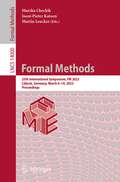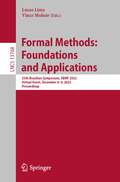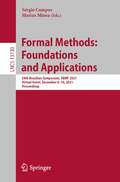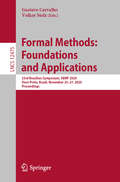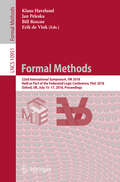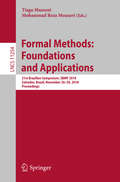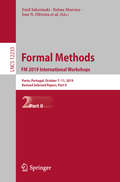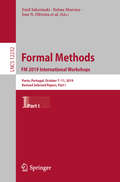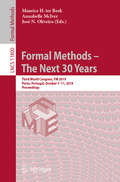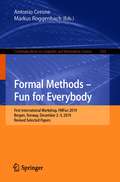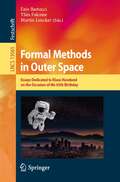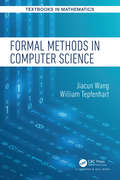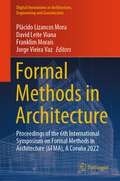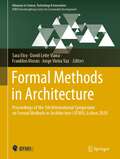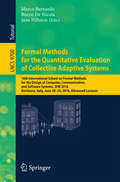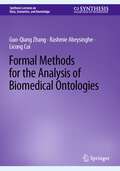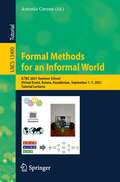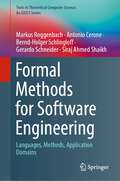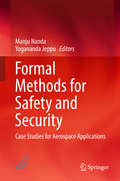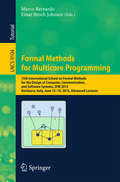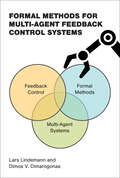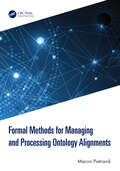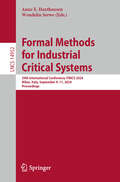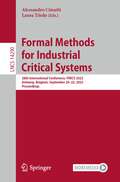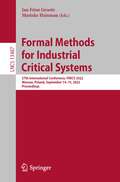- Table View
- List View
Formal Methods: 25th International Symposium, FM 2023, Lübeck, Germany, March 6–10, 2023, Proceedings (Lecture Notes in Computer Science #14000)
by Martin Leucker Marsha Chechik Joost-Pieter KatoenThis book constitutes the refereed proceedings of the 25th International Symposium on Formal Methods, FM 2023, which took place in Lübeck, Germany, in March 2023. The 26 full paper, 2 short papers included in this book were carefully reviewed and selected rom 95 submissions. They have been organized in topical sections as follows: SAT/SMT; Verification; Quantitative Verification; Concurrency and Memory Models; Formal Methods in AI; Safety and Reliability. The proceedings also contain 3 keynote talks and 7 papers from the industry day.
Formal Methods: 25th Brazilian Symposium, SBMF 2022, Virtual Event, December 6–9, 2022, Proceedings (Lecture Notes in Computer Science #13768)
by Lucas Lima Vince MolnárThis book constitutes the refereed proceedings of the 25th Brazilian Symposium on Formal Methods, SBMF 2022, which was held virtually in December 2022. The 8 regular papers presented in this book were carefully reviewed and selected from 15 submissions. The symposium focuses on the development, dissemination, and use of formal methods for the construction of high-quality computational systems, aiming to promote opportunities for researchers and practitioners with an interest in formal methods to discuss the recent advances in this area.
Formal Methods: 24th Brazilian Symposium, SBMF 2021, Virtual Event, December 6–10, 2021, Proceedings (Lecture Notes in Computer Science #13130)
by Sérgio Campos Marius MineaThis book constitutes the refereed proceedings of the 24rd Brazilian Symposium on Formal Methods, SBMF 2021, which was held in December 2021. Due to COVID 19-pandemic it took place virtually. The 8 regular papers presented in this book were carefully reviewed and selected from 15 submissions. The papers detail the development, dissemination, and use of formal methods for the construction of high-quality computational systems, aiming to promote opportunities for researchers and practitioners with an interest in formal methods to discuss the recent advances in this area
Formal Methods: 23rd Brazilian Symposium, SBMF 2020, Ouro Preto, Brazil, November 25–27, 2020, Proceedings (Lecture Notes in Computer Science #12475)
by Volker Stolz Gustavo CarvalhoThis book constitutes the refereed proceedings of the 23rd Brazilian Symposium on Formal Methods, SBMF 2020, which was supposed to take place in Ouro Preto, Brazil, in November 2020. Instead the symposium took place virtually due to the COVID-19 pandemic. The 10 regular papers presented together with 3 invited talks in this book were carefully reviewed and selected from 17 submissions. The papers are organized in topical sections such as: experience reports; models, languages and semantics; and software product lines.Chapter ‘Safety Assurance of a High Voltage Controller for an Industrial Robotic System’ is available open access under a Creative Commons Attribution 4.0 International License via link.springer.com.
Formal Methods: 22nd International Symposium, FM 2018, Held as Part of the Federated Logic Conference, FloC 2018, Oxford, UK, July 15-17, 2018, Proceedings (Lecture Notes in Computer Science #10951)
by Bill Roscoe Klaus Havelund Jan Peleska Erik De VinkThis book constitutes the refereed proceedings of the 22nd International Symposium on Formal Methods, FM 2018, held in Oxford, UK, in July 2018.The 44 full papers presented together with 2 invited papers were carefully reviewed and selected from 110 submissions. They present formal methods for developing and evaluating systems. Examples include autonomous systems, robots, and cyber-physical systems in general. The papers cover a broad range of topics in the following areas: interdisciplinary formal methods; formal methods in practice; tools for formal methods; role of formal methods in software systems engineering; and theoretical foundations.
Formal Methods: 21st Brazilian Symposium, SBMF 2018, Salvador, Brazil, November 26–30, 2018, Proceedings (Lecture Notes in Computer Science #11254)
by Mohammad Reza Mousavi Tiago MassoniThis book constitutes the refereed proceedings of the 21st Brazilian Symposium on Formal Methods, SBMF 2018, which took place in Salvador, Brazil, in November 2018.The 16 regular papers presented in this book were carefully reviewed and selected from 30 submissions. The papers are organized in topical sections such as: techniques and methodologies; specification and modeling languages; theoretical foundations; verification and validation; experience reports regarding teaching formal methods; and applications.Chapter “TeSSLa: Temporal Stream-Based Specification Language” is available open access under a Creative Commons Attribution 4.0 International License via link.springer.com.
Formal Methods. FM 2019 International Workshops: Porto, Portugal, October 7–11, 2019, Revised Selected Papers, Part II (Lecture Notes in Computer Science #12233)
by Antonio Cerone Riccardo Guidotti Martin Kutrib Emil Sekerinski José N. Oliveira Brijesh Dongol Nelma Moreira Daniel Ratiu Marie Farrell Matt Luckcuck Diego Marmsoler José Campos Troy Astarte Laure Gonnord Luis Couto Pedro Monteiro David DelmasThis book constitutes the refereed proceedings of the workshops which complemented the 23rd Symposium on Formal Methods, FM 2019, held in Porto, Portugal, in October 2019. This volume presents the papers that have been accepted for the following workshops: Third Workshop on Practical Formal Verification for Software Dependability, AFFORD 2019; 8th International Symposium From Data to Models and Back, DataMod 2019; First Formal Methods for Autonomous Systems Workshop, FMAS 2019; First Workshop on Formal Methods for Blockchains, FMBC 2019; 8th International Workshop on Formal Methods for Interactive Systems, FMIS 2019; First History of Formal Methods Workshop, HFM 2019; 8th International Workshop on Numerical and Symbolic Abstract Domains, NSAD 2019; 9th International Workshop on Open Community Approaches to Education, Research and Technology, OpenCERT 2019; 17th Overture Workshop, Overture 2019; 19th Refinement Workshop, Refine 2019; First International Workshop on Reversibility in Programming, Languages, and Automata, RPLA 2019; 10th International Workshop on Static Analysis and Systems Biology, SASB 2019; and the 10th Workshop on Tools for Automatic Program Analysis, TAPAS 2019.
Formal Methods. FM 2019 International Workshops: Porto, Portugal, October 7–11, 2019, Revised Selected Papers, Part I (Lecture Notes in Computer Science #12232)
by Antonio Cerone Riccardo Guidotti Martin Kutrib Emil Sekerinski José N. Oliveira Brijesh Dongol Nelma Moreira Daniel Ratiu Marie Farrell Matt Luckcuck Diego Marmsoler José Campos Troy Astarte Laure Gonnord Luis Couto Pedro Monteiro David DelmasThis book constitutes the refereed proceedings of the workshops which complemented the 23rd Symposium on Formal Methods, FM 2019, held in Porto, Portugal, in October 2019. This volume presents the papers that have been accepted for the following workshops: Third Workshop on Practical Formal Verification for Software Dependability, AFFORD 2019; 8th International Symposium From Data to Models and Back, DataMod 2019; First Formal Methods for Autonomous Systems Workshop, FMAS 2019; First Workshop on Formal Methods for Blockchains, FMBC 2019; 8th International Workshop on Formal Methods for Interactive Systems, FMIS 2019; First History of Formal Methods Workshop, HFM 2019; 8th International Workshop on Numerical and Symbolic Abstract Domains, NSAD 2019; 9th International Workshop on Open Community Approaches to Education, Research and Technology, OpenCERT 2019; 17th Overture Workshop, Overture 2019; 19th Refinement Workshop, Refine 2019; First International Workshop on Reversibility in Programming, Languages, and Automata, RPLA 2019; 10th International Workshop on Static Analysis and Systems Biology, SASB 2019; and the 10th Workshop on Tools for Automatic Program Analysis, TAPAS 2019.
Formal Methods – The Next 30 Years: Third World Congress, FM 2019, Porto, Portugal, October 7–11, 2019, Proceedings (Lecture Notes in Computer Science #11800)
by Maurice H. ter Beek Annabelle McIver José N. OliveiraThis book constitutes the refereed proceedings of the 23rd Symposium on Formal Methods, FM 2019, held in Porto, Portugal, in the form of the Third World Congress on Formal Methods, in October 2019. The 44 full papers presented together with 3 invited presentations were carefully reviewed and selected from 129 submissions. The papers are organized in topical sections named: Invited Presentations; Verification; Synthesis Techniques; Concurrency; Model Checking Circus; Model Checking; Analysis Techniques; Specification Languages; Reasoning Techniques; Modelling Languages; Learning-Based Techniques and Applications; Refactoring and Reprogramming; I-Day Presentations.
Formal Methods – Fun for Everybody: First International Workshop, FMFun 2019, Bergen, Norway, December 2–3, 2019, Revised Selected Papers (Communications in Computer and Information Science #1301)
by Antonio Cerone Markus RoggenbachThis volume constitutes the post-workshop proceedings of the First International Workshop on Formal Methods – Fun for Everybody, FMFun 2019, held in Bergen, Norway, in December 2019.The 7 revised full papers and 2 revised short papers presented in this volume were carefully reviewed and selected from 15 submissions. A white paper and two keynote papers are also included. The papers explore ways of utilizing the pathway to transforming and spreading formal methods. The vision of this workshop series is that formal methods ought to be taught in such a way that every student can have fun with it.
Formal Methods in Outer Space: Essays Dedicated to Klaus Havelund on the Occasion of His 65th Birthday (Lecture Notes in Computer Science #13065)
by Ezio Bartocci Martin Leucker Yliès FalconeThis Festschrift, dedicated to Klaus Havelund on the occasion of his 65th birthday, celebrated in 2021 due to the COVID-19 pandemic, contains papers written by many of his closest friends and collaborators.After work as a software programmer in various Danish companies, Klaus has held research positions at various institutes, including the Danish Datamatics Center, the Ecole Polytechnique, LIP 6 lab in Paris, Aalborg University, and NASA Ames. Since 2006 he has been working in NASA’s Jet Propulsion Laboratory (JPL), the federally funded center managed by Caltech whose primary function is to construct and operate planetary robotic spacecraft. His professional awards include the Turning Goals Into Reality engineering innovation award, the Outstanding Technology Development award, and the JPL Mariner, Ranger, Voyager, and Magellan awards. Klaus has provided constant and generous service to the formal methods community by organizing, participating in, and chairing numerous committees. His academic awards include the 2020 SIGSOFT Impact Paper Award, the RV 2018 Test of Time award, and the ASE 2014 and ASE 2016 Most Influential Paper awards. His research activities have generated more than 100 publications with more than 100 collaborators, cited over 12,000 times. The book title reflects Klaus’s main research and engineering focus throughout his career: formal methods, often applied at NASA. The contributions, which went through a peer-review process, cover a wide spectrum of the topics related to his scientific interests, including programming language design, static analysis, runtime verification, dynamic assurance, and automata learning.
Formal Methods in Computer Science (Textbooks In Mathematics Ser.)
by Jiacun WangThis textbook gives students a comprehensive introduction to formal methods and their application in software and hardware specification and verification. It has three parts: The first part introduces some fundamentals in formal methods, including set theory, functions, finite state machines, and regular expressions. The second part focuses on logi
Formal Methods in Architecture: Proceedings of the 6th International Symposium on Formal Methods in Architecture (6FMA), A Coruña 2022 (Digital Innovations in Architecture, Engineering and Construction)
by David Leite Viana Franklim Morais Jorge Vieira Vaz Plácido Lizancos MoraThis book comprises the select proceedings of the 6th International Symposium on Formal Methods in Architecture (6FMA), A Coruña 2022. The contents focus on the use of methodologies, especially those that have witnessed recent developments stemming from mathematical and computer sciences and are developed in a collaborative way with architecture and related fields. This book constitutes a contribution to the debate and to the introduction of new methodologies and tools in the mentioned fields that derive from the application of formal methods in the creation of new explicit languages for problem-solving in architecture and urbanism. Some of the themes in the book are CAD and BIM, mixed realities, photogrammetry and 3D scan, architectural design automation, urban and building performance analysis, SCAVA-space configuration, accessibility and visibility analysis. This book proves a valuable resource for those in academia and industry.
Formal Methods in Architecture: Proceedings of the 5th International Symposium on Formal Methods in Architecture (5FMA), Lisbon 2020 (Advances in Science, Technology & Innovation)
by Sara Eloy David Leite Viana Franklim Morais Jorge Vieira VazThis edited book gathers research studies presented at the 5th International Symposium on Formal Methods in Architecture (5FMA), Lisbon 2020. Studies focus on the use of methodologies, especially those that have witnessed recent developments, that stem from the mathematical and computer sciences and are developed in a collaborative way with architecture and related fields. This book constitutes a contribution to the debate and to the introduction of new methodologies and tools in the mentioned fields that derive from the application of formal methods in the creation of new explicit languages for problem-solving in architecture and urbanism. It adds valuable insight into the development of new practices solving identified societal problems and promoting the digital transformation of institutions in the mentioned fields. The primary audience of this book will be from the fields of architecture, urban planning, civil engineering, AEC, landscape design, computer sciences and mathematics, both academicians and professionals.
Formal Methods for the Quantitative Evaluation of Collective Adaptive Systems
by Marco Bernardo Rocco De Nicola Jane HillstonThis book presents 8 tutorial lectures given by leading researchers at the 16th edition of the International School on Formal Methods for the Design of Computer, Communication and Software Systems, SFM 2016, held in Bertinoro, Italy, in June 2016. SFM 2016 was devoted to the Quantitative Evaluation of Collective Adaptive Systems and covered topics such as self-organization in distributed systems, scalable quantitative analysis, spatio-temporal models, and aggregate programming.
Formal Methods for the Analysis of Biomedical Ontologies (Synthesis Lectures on Data, Semantics, and Knowledge)
by Guo-Qiang Zhang Rashmie Abeysinghe Licong CuiThe book synthesizes research on the analysis of biomedical ontologies using formal concept analysis, including through auditing, curation, and enhancement. As the evolution of biomedical ontologies almost inevitably involves manual work, formal methods are a particularly useful tool for ontological engineering and practice, particularly in uncovering unexpected "bugs" and content materials. The book first introduces simple but formalized strategies for discovering undesired and incoherent patterns in ontologies before exploring the application of formal concept analysis for semantic completeness. The book then turns to formal concept analysis, a classical approach used in the mathematical treatment of orders and lattices, as an ontological engineering principle, focusing on the structural property of ontologies with respect to its conformation to lattice or not (non-lattice). The book helpfully covers the development of more efficient algorithms for non-lattice detection and extraction required by exhaustive lattice/non-lattice analysis. The book goes on to highlight the power and utility of uncovering non-lattice structure for debugging ontologies and describes methods that leverage the linguistic information in concept names (labels) for ontological analysis. It also addresses visualization and performance evaluation issues before closing with an overview and forward-looking perspectives on the field. This book is intended for graduate students and researchers interested in biomedical ontologies and their applications. It can be a useful supplement for courses on knowledge representation and engineering and also provide readers with a reference for related scientific publications and literature to assist in identifying potential research topics. All mathematical concepts and notations used in this book can be found in standard discrete mathematics textbooks, and the appendix at the end of the book provides a list of key ontological resources, as well as annotated non-lattice and lattice examples that were discovered using the authors' methods, demonstrating how "bugs are fixed" by converting non-lattices to lattices with minimal edit changes.
Formal Methods for an Informal World: ICTAC 2021 Summer School, Virtual Event, Astana, Kazakhstan, September 1–7, 2021, Tutorial Lectures (Lecture Notes in Computer Science #13490)
by Antonio CeroneThis volume includes six lectures given at the ICTAC (International Colloquium on Theoretical Aspects of Computing) School on Formal Methods for an Informal World, held on September 1-7, 2021, originally scheduled to take place in Astana but held in virtual mode due to the pandemic.The school addressed the use of formal methods at various levels of rigour in different application domains: human-computer interaction, cognitive science, business process management, robotics, and healthcare. The emphasis of the school was on practical applications in which formal methods provide unambiguous descriptions of the real world that facilitate understanding and formal and informal analysis. The target audience consists of graduate students, young researchers and industrial practitioners, from both computer science and other fields that make use of computational methods.
Formal Methods for Software Engineering: Languages, Methods, Application Domains (Texts in Theoretical Computer Science. An EATCS Series)
by Antonio Cerone Siraj Ahmed Shaikh Markus Roggenbach Gerardo Schneider Bernd-Holger SchlingloffSoftware programs are formal entities with precise meanings independent of their programmers, so the transition from ideas to programs necessarily involves a formalisation at some point. The first part of this graduate-level introduction to formal methods develops an understanding of what constitutes formal methods and what their place is in Software Engineering. It also introduces logics as languages to describe reasoning and the process algebra CSP as a language to represent behaviours. The second part offers specification and testing methods for formal development of software, based on the modelling languages CASL and UML. The third part takes the reader into the application domains of normative documents, human machine interfaces, and security. Use of notations and formalisms is uniform throughout the book. Topics and features: Explains foundations, and introduces specification, verification, and testing methods Explores various application domains Presents realistic and practical examples, illustrating concepts Brings together contributions from highly experienced educators and researchers Offers modelling and analysis methods for formal development of software Suitable for graduate and undergraduate courses in software engineering, this uniquely practical textbook will also be of value to students in informatics, as well as to scientists and practical engineers, who want to learn about or work more effectively with formal theories and methods. Markus Roggenbach is a Professor in the Dept. of Computer Science of Swansea University. Antonio Cerone is an Associate Professor in the Dept. of Computer Science of Nazarbayev University, Nur-Sultan. Bernd-Holger Schlingloff is a Professor in the Institut für Informatik of Humboldt-Universität zu Berlin. Gerardo Schneider is a Professor in the Dept. of Computer Science and Engineering of University of Gothenburg. Siraj Ahmed Shaikh is a Professor in the Institute for Future Transport and Cities of Coventry University.
Formal Methods for Safety and Security
by Manju Nanda Yogananda JeppuThis volume is the outcome of deliberations on formal methods in aerospace. The book specially delves into the use of formal methods for verification, validation, and optimization of software in safety critical and time critical applications, such as those in aerospace engineering. The chapters in this book are authored by leading corporate and government R&D scientists. The contents of this book will be useful to researchers and professionals alike.
Formal Methods for Multicore Programming
by Marco Bernardo Einar Broch JohnsenThis book presents 5 tutorial lectures given by leading researchers at the 15th edition of the International School on Formal Methods for the Design of Computer, Communication and Software Systems, SFM 2015, held in Bertinoro, Italy, in June 2015. SFM 2015 was devoted to multicore programming and covered topics such as concurrency and coordination mechanisms, architecture and memory models and type systems.
Formal Methods for Multi-Agent Feedback Control Systems (Cyber Physical Systems Series)
by Lars Lindemann Dimos V. DimarogonasAn introduction to formal methods for feedback control of multi-agent systems with safety and performance guarantees.Multi-agent control systems can accomplish tasks that single-agent systems cannot address, such as aerial surveillance of large areas by a group of drones. In Formal Methods for Multi-Agent Feedback Control Systems, Lars Lindemann and Dimos Dimarogonas provide an accessible introduction to formal methods for feedback control of multi-agent systems. Their book is the first to bridge the gap between formal methods and feedback control for the scalable design of cyber-physical systems. The material covered is intended for scientists, engineers, and students, and no background in formal methods or control theory is required. The authors also highlight future research directions for those working at the intersection of formal methods and control.In control theory, the goal is to design feedback control laws for dynamical systems that achieve control objectives such as stability or forward invariance of sets. Formal methods, on the other hand, provide verification and design techniques for more complex system specifications using temporal logics. However, their high computational cost limits scaling beyond a small number of agents. Besides scalability, another central challenge is to achieve robustness in the system design. Thus, the authors focus on the design of scalable and robust feedback control algorithms for multi-agent control systems under temporal logic specifications.
Formal Methods for Managing and Processing Ontology Alignments
by Marcin PietranikOntologies are formal knowledge representation methods that can provide means for a shared understanding of a given domain. To enable meaningful communication and interoperability between two or more information systems that utilize independently created ontologies, a bridge between them is necessary, often referred to as an ontology alignment. Formal Methods for Managing and Processing Ontology Alignments provides complete ontology alignment lifecycle, including modelling, methods, and maintenance processes.Summarizing the author's research from the past ten years, this book consolidates findings previously published in prestigious international journals and presented at leading conferences. Each chapter is designed to be self-contained, allowing readers to approach the material modularly. The text introduces basic mathematical concepts, and later chapters build upon these foundations, but each focuses on specific aspects of ontology alignment, making the content accessible and easy to follow. Key Features Includes formal definitions of ontologies and ontology alignment along with a set of methods for providing semantics of attributes and relations. Provides application of fuzzy logic in the task of ontology alignment. Contains methods of managing the evolution of ontologies and their alignments. Proposes novel methods of assessing the quality ontology alignment. Situated in the fields of knowledge representation and semantic technologies, this book is an invaluable resource for both academic researchers and practitioners, as well as students looking to deepen their understanding.
Formal Methods for Industrial Critical Systems: 29th International Conference, FMICS 2024, Milan, Italy, September 9–11, 2024, Proceedings (Lecture Notes in Computer Science #14952)
by Anne E. Haxthausen Wendelin SerweThis book constitutes the proceedings of the 29th International Conference on Formal Methods for Industrial Critical Systems, FMICS 2024, held in Milan, Italy, during September 9–13, 2024. The 14 full papers included in this book were carefully reviewed and selected from 22 submissions. These papers have been organized in the following topical sections: Real-Time Systems/ Robotics; Semantics and Verification; Case Studies; Neural Networks.
Formal Methods for Industrial Critical Systems: 28th International Conference, FMICS 2023, Antwerp, Belgium, September 20–22, 2023, Proceedings (Lecture Notes in Computer Science #14290)
by Alessandro Cimatti Laura TitoloThis book constitutes the proceedings of the 28th International Conference on Formal Methods for Industrial Critical Systems, FMICS 2023, held in Antwerp, Belgium, during September 20–22, 2023. The 14 full papers included in this book were carefully reviewed and selected from 24 submissions. The papers focus on development and application of formal methods in industry. FMICS is a platform for scientists and engineers who are active in the area of formal methods and interested in exchanging their experiences in the industrial usage of these methods. FMICS also strives to promote research and development for the improvement of formal methods and tools for industrial applications.
Formal Methods for Industrial Critical Systems: 27th International Conference, FMICS 2022, Warsaw, Poland, September 14–15, 2022, Proceedings (Lecture Notes in Computer Science #13487)
by Marieke Huisman Jan Friso GrooteThis book constitutes the proceedings of the 27th International Conference on Formal Methods for Industrial Critical Systems, FMICS 2022, which took place in Warsaw, Poland, in September 2022. The 13 full papers included in this book were carefully reviewed and selected from 22 submissions. They were organized in topical sections as follows: Certification; industrial use cases; testing and monitoring; and methodology.
